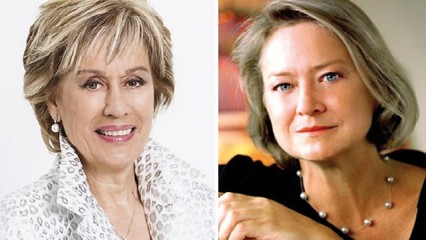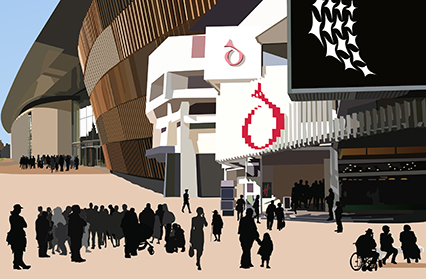Steph Power recaps the on-stage conversation between legendary soprano Kiri Te Kanawa and broadcaster Kate Adie entitled ‘In Confidence’.
Each of the young professionals participating in this year’s BBC Cardiff Singer of the World will have grown up with, or have heard of, the famous biennial competition. Founded in 1983 to celebrate the opening of Cardiff’s St David’s Hall, the contest is arguably the most prestigious singing competition in the world, with a stature reflected in its distinguished Patron, the New Zealand lyric soprano Dame Kiri Te Kanawa; a beloved and iconic figure for singers and audiences everywhere.
What better way to open proceedings in 2015 than to bring Te Kanawa together in a fringe event with another inspirational figure, the writer and broadcaster Kate Adie, for a conversation ‘In Confidence’? On the surface, the combination of opera star and news correspondent specialising in war zones might seem surprising, but Te Kanawa and Adie come from the same generation, and share a common inheritance from a sixties London in which young people believed that anything was possible.
Many of their peers will have fallen dispirited by the wayside, but both went on to achieve the very pinnacle of success in their respective, often cut-throat professions. They are passionately determined, brilliant women and, whilst Adie has clearly been willing to put her very life on the line, Te Kanawa has often stood out in the opera world as unafraid to court controversy to fight for the things she believes in.
Fittingly, the event turned out to be not so much a conversation with stories back and forth, but an interview skillfully focused by Adie on Te Kanawa’s life and work on the eve of Cardiff Singer. Adie is quietly very knowledgeable about opera, and both women came across as warm and witty raconteurs with their feet firmly on the ground. Te Kanawa acknowledged Adie throughout, but only in a discussion of air travel did Adie allow us to glimpse her own life by way of wry understatement: ‘I’ve travelled in my job’. Drawing appreciative laughter from the audience, she described how a plane she once flew in was grounded until the occupants had a whip-round to pay for fuel; a very different scenario from the nonetheless gruelling kinds of travel associated with opera stardom.
In many ways, Adie was the ideal partner for Te Kanawa, who was herself full of disarming modesty. The soprano was happy to talk intimately and informally, and she shared an array of hilarious and poignant anecdotes with a characteristically welcoming Wales Millennium Centre audience. Only when she persisted in moving to more serious territory, concerning the plight of young opera singers today, did Adie seem uncomfortable, and several times rather frustratingly steered her interviewee back to less choppy political waters.

However, there were many thoughtful moments and flashes of fire. We learned how Te Kanawa came to Britain as a young singer, trained by a nun who was ‘as tough as old boots’, with plaudits already won in Adelaide as a star in the making. Throughout her studies in London, she described how she ‘was really a bad student’; not driven to succeed as students are expected to be these days, but rather happy to go along with whatever seemed a good idea. When she accepted the arch role of Countess in Mozart’s The Marriage of Figaro at the Royal Opera House, a reaction from a fellow singer in the canteen speaks volumes about the inevitable resentments: ‘Bloody ridiculous. Who gave you that?’
This unnamed singer later congratulated her on ‘nailing the role’ – although Kiri Te Kanawa was also keen to stress how important it is for young singers not to take on big, demanding parts before they are ready, as ‘the voice always grows with less … it takes time for it to develop’. Unusually, having first thought she was a mezzo, it was a while before she realised her true voice-type was soprano. And what an exquisite, clear and rich soprano it has proved to be, as revealed in a moving succession of audio and video archive clips through the evening, beginning with an early ‘Nuns’ Chorus’ from Johann Strauss II’s operetta, Casanova – ‘we looked like a bunch of vestal virgins’ – and ending with a searing ‘Ave Maria’ as Desdemona in Verdi’s Otello.
There were many valuable insights among the tales of a life lived – to paraphrase – ‘arriving at the back door to find the dressing rooms, and be hounded by everyone from conductors (excellent ones and ones from hell) to wardrobe and make-up people, in order to sing out, and then go home again.’ All with her unbounded passion for singing and opera kept firmly intact.
‘Quality, pure quality’ has been Kiri Te Kanawa’s perpetual cry, and to remain realistic whatever the environment and the repertoire. It was evident from her responses that, however much pleasure she gained from the recognition, she refused to allow her head to be turned by the continual flow of prestigious roles and engagements – not forgetting that famous invitation to sing at the wedding of Prince Charles and Lady Diana in 1981 (her ‘first thought was the dress’ and her overriding concern at the occasion was ‘to keep the rhythm’ of Handel’s adored ‘Let the Bright Seraphim’).
On the other hand, neither was she cowed by those opera snobs who sneered at her sojourn into ‘crossover’ territory with musicals and the Maori songs so key to her ethnic heritage. As to the first, she ‘loved the croony thing’, and felt honoured to be working with top professionals, whatever the field. As to the second, it’s been a ‘labour of love’, and she’s always wanted to ‘do things that have longevity’ and ‘will make a difference’.
She continues to have ambition, not for herself, but for the students she is supporting through her teaching and her Kiri Te Kanawa Foundation (and, of course, Cardiff Singer), knowing full well the agonies and trials they face. ‘You can study for twenty years’ she said, ‘and never become a singer’, and so they must always remain rooted in reality. Describing how the UK has ‘good teachers and great schools’, it was impressive that she insisted on returning to the disastrous ‘visa situation’ despite Adie’s attempts to deflect her with such niceties as her recent Downton Abbey appearance.
Te Kanawa was never less than gracious, nor did she appear frustrated, but continued to talk about ‘the real heartbreak’ that many foreign students are now faced with, as increasing numbers are refused entry for study or to remain in the UK to work afterwords – which, after all, she herself benefited from as a young person. This, she said is the ‘big brick wall’ she is facing and doesn’t ‘know what to do about’ as ‘the borders are closing fast’. As she chillingly but no doubt accurately put it, officials acknowledge that ‘singing is good for us – but in your own country’.
These are important things for all of us to hear who care about the erosion of personal and artistic freedom, and the future for young people and opera itself – and it will be interesting to see how much of that part of the interview makes it into the forthcoming BBC highlights programme. Kiri Te Kanawa remains very much a woman on a mission. She may be a famous diva with a beautiful voice that has touched millions, but she is far from wishing to rest on her laurels, or from succumbing to our new age of gushing celebrity.
Banner illustration by Dean Lewis.












